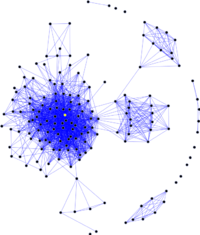Culture
Mead (1955) said that culture “is an abstraction of the body of learned behaviour which a group of people who share the same tradition transmit entire to their children, and, in part, to adult immigrants who become members of the society.”[1]
Theoretical culture
Def.
- "[t]he arts, customs, and habits that characterize a particular society or nation",[2]
- "[t]he beliefs, values, behaviour and material objects that constitute a people's way of life",[2]
- "[a]ny knowledge passed from one generation to the next, not necessarily with respect to human beings",[2] or
- "[t]he language and peculiarities of a geographical location"[2]
is called a culture.
"A culture is the combination of the language that you speak and the geographical location you belong to. It also includes the way you represent dates, times and currencies."[2]
See also
References
- ↑ Mead, M. (Ed.). (1955). Cultural patterns and technical change. New York: Mentor Books.
- 1 2 3 4 5 "culture, In: Wiktionary". San Francisco, California: Wikimedia Foundation, Inc. December 23, 2012. Retrieved 2013-03-01.
Further reading
External links
| Humanities resources |
|---|
| | Activities | | | | Articles | | | | Categories |
Agriculture ·
Anthropology ·
Archaeology ·
Art ·
Arts ·
Culture ·
Dominant group ·
Education ·
Genetics ·
History ·
Humanities ·
Language ·
Linguistics ·
Literature ·
Medicine ·
Philosophy ·
Psychology ·
Religious studies ·
Semantics ·
Social psychology
| | | Courses | | | | Fields | | | | Glossaries | | | | Lectures | | | | Lessons |
| | | Lists |
| | | Original research | | | | Portals |
History ·
Social sciences
| | | Problem sets | | | | Projects | | | | Proposals | | | | Quizzes | | | | Schools |
Agriculture ·
Alternative medicine ·
Anthropology ·
Archeology ·
Classics ·
Dentistry ·
Gastronomy ·
History ·
Life ·
Medicine ·
Pharmacy ·
Veterinary medicine
| | | Topics | |
|
 |
Educational level: this is a research resource. |
 |
Resource type: this resource is an article. |
 |
Resource type: this resource contains a lecture or lecture notes. |
.jpg) |
Subject classification: this is a humanities resource. |
 |
Subject classification: this is a psychology resource . |
 |
Subject classification: this is a Sociology resource. |